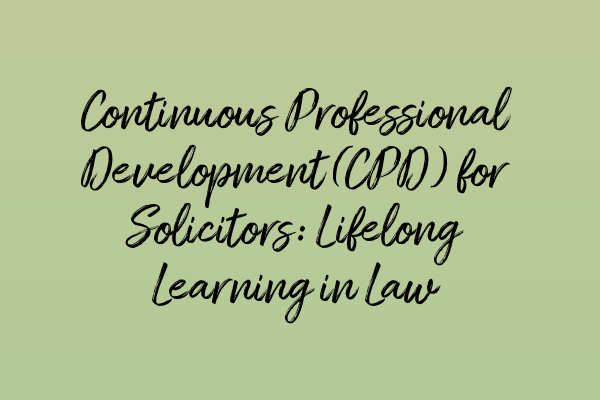Continuous Professional Development (CPD) for Solicitors: Lifelong Learning in Law
As a solicitor, it is not enough to simply pass your qualifying exams and start practicing law. The legal profession is constantly evolving, with new legislation, case law, and legal developments emerging on a regular basis. To stay competent and provide the best possible service to your clients, it is crucial to engage in continuous professional development (CPD).
CPD refers to the ongoing process of learning and development that solicitors undertake throughout their careers. It is an essential requirement set by the Solicitors Regulation Authority (SRA) to ensure that solicitors maintain high standards and stay up-to-date with changes in the legal landscape.
Why is CPD Important?
Continuous professional development not only enhances your knowledge and skills as a solicitor but also demonstrates your commitment to professional excellence. By staying informed about new legal developments, you can provide accurate and relevant advice to your clients, bringing added value to your practice.
CPD also helps you to meet your regulatory obligations as a solicitor. The SRA requires solicitors to complete a minimum number of CPD hours each year. By engaging in CPD activities, you can ensure that you comply with these requirements and maintain your practicing certificate.
Types of CPD Activities
When it comes to CPD, there are various types of activities that solicitors can undertake. These include:
- Attending conferences, seminars, and workshops
- Participating in webinars and online courses
- Reading legal journals and publications
- Engaging in mentoring and coaching programs
- Contributing to legal research and writing articles
It is important to choose CPD activities that are relevant to your practice area and align with your professional development goals. For example, if you specialize in property law, you may want to attend workshops or webinars specifically focused on updates in UK property laws.
SQE Preparation for Property Practice
One area of legal practice that solicitors often specialize in is property law. If you are looking to enhance your knowledge and skills in this area, you may find our article on SQE Preparation for Property Practice: Mapping Out Your Strategy helpful.
This article provides insights and strategies for preparing for the Solicitors Qualifying Examination (SQE) in property practice. It covers key topics and areas of focus to help you effectively navigate the exam and excel in your property law practice.
Updates in UK Property Laws
Keeping up with changes in UK property laws is essential for solicitors practicing in this area. Our article on Updates in UK Property Laws: Key Changes and Implications provides a comprehensive overview of recent updates in property laws and their implications for property transactions.
Legal Challenges in Property Transactions
Legal challenges in property transactions can be complex, and as a solicitor, it is important to have a thorough understanding of these challenges. Our article on Legal challenges in property transactions: A comprehensive guide offers valuable insights and guidance on dealing with common legal challenges that arise in property transactions.
Navigating Lease Laws in the UK
Lease laws in the UK can be intricate, and both tenants and landlords need to navigate them carefully. If you are involved in lease law matters, our article on Navigating Lease Laws in the UK: Essential Guidelines for Tenants and Landlords provides essential guidelines to help you understand and address issues related to lease agreements.
Dominate Property Law Questions
Preparing for property law-related questions in exams or legal practice can be challenging. Our article on Dominate Property Law Questions: Avoiding Common Pitfalls offers valuable tips and strategies to help you overcome common pitfalls and confidently tackle property law questions.
In Conclusion
Continuous professional development is a vital aspect of a solicitor’s career journey. By engaging in CPD activities and staying informed about legal developments, you can provide exceptional legal services to your clients and maintain your professional competence. Remember to choose CPD activities that are relevant to your practice area and align with your professional goals.


Leave a Reply